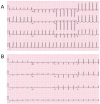Capecitabine-mediated heart failure in colorectal cancer: a case series
- PMID: 33709051
- PMCID: PMC7936921
- DOI: 10.1093/ehjcr/ytab079
Capecitabine-mediated heart failure in colorectal cancer: a case series
Abstract
Background: Capecitabine is a pyrimidine antimetabolite that inhibits thymidylate synthase and is commonly used in the treatment of colorectal cancer. Adverse cardiac side effects are reported in 1-18% of patients receiving Capecitabine. The most commonly proposed mechanism of cardiotoxicity in the setting of Capecitabine use is vasospasm of the coronary arteries. However, cardiotoxicity can also present as an acute coronary syndrome, arrhythmia, hypertension, and/or sudden cardiac death. Profound non-vasospastic cardiotoxicity is rare.
Case summary: We describe two cases of acute heart failure leading to cardiogenic shock in patients shortly after exposure to Capecitabine. Both patients did not demonstrate the characteristic transient ST elevation seen in patients with coronary artery vasospasms secondary to Capecitabine. Both patients required admission to the Acute Cardiac Care Unit requiring vasopressor and inotropic support. Thorough diagnostic investigations including echocardiography, cardiac magnetic resonance imaging, and cardiac computed tomography did not identify infarction, myocarditis, or any infiltrative process to explain their symptoms. Both patients had complete resolution of cardiac function, with no long-term sequalae.
Discussion: In patients receiving Capecitabine, reversible heart failure leading to cardiogenic shock should be considered as a potential cardiotoxic side effect.
Keywords: Capecitabine; Cardio-oncology; Cardiogenic shock; Cardiotoxicity; Case report; Heart failure.
© The Author(s) 2021. Published by Oxford University Press on behalf of the European Society of Cardiology.
Figures



References
-
- Miwa M, Ura M, Nishida M, Sawada N, Ishikawa T, Mori K. et al. Design of a novel oral fluoropyrimidine carbamate, capecitabine, which generates 5 fluorouracil selectively in tumours by enzymes concentrated in human liver and cancer tissue. Eur J Cancer 1998;34:1274–1281. - PubMed
-
- Polk A, Vaage-Nilsen M, Vistisen K, Nielsen DL.. Cardiotoxicity in cancer patients treated with 5-fluorouracil or capecitabine: a systematic review of incidence, manifestations and predisposing factors. Cancer Treat Rev 2013;39:974–984. - PubMed
-
- Layoun ME, Wickramasinghe CD, Peralta MV, Yang EH.. Fluoropyrimidine-induced cardiotoxicity: manifestations, mechanisms, and management. Curr Oncol Rep 2016;18:1–12. - PubMed
-
- Mosseri M, Fingert HJ, Varticovski L, Chokshi S, Isner JM.. In vitro evidence that myocardial ischemia resulting from 5-fluorouracil chemotherapy is due to protein kinase c-mediated vasoconstriction of vascular smooth muscle. Cancer Res 1993;53:3028–3033. - PubMed
-
- Südhoff T, Enderle MD, Pahlke M, Petz C, Teschendorf C, Graeven U. et al. 5-fluorouracil induces arterial vasocontractions. Ann Oncol 2004;15:661–664. - PubMed
Publication types
LinkOut - more resources
Full Text Sources
Other Literature Sources
